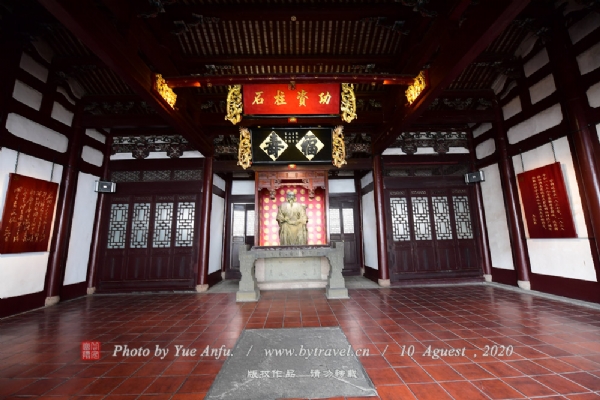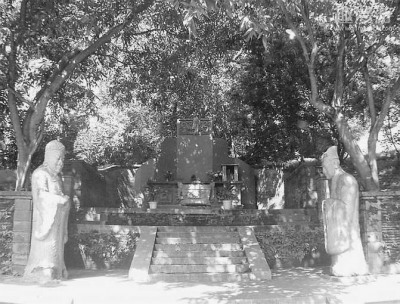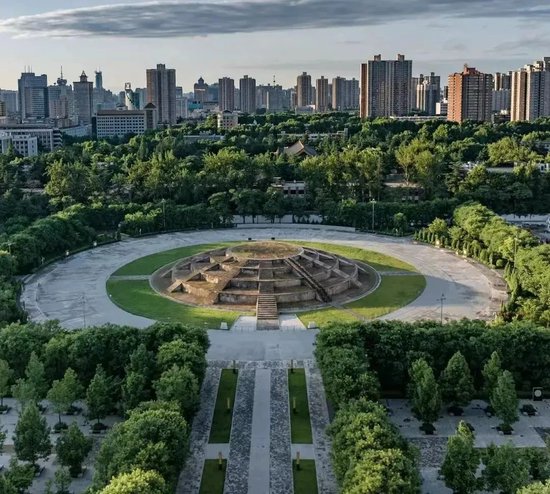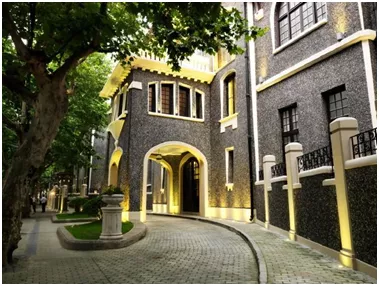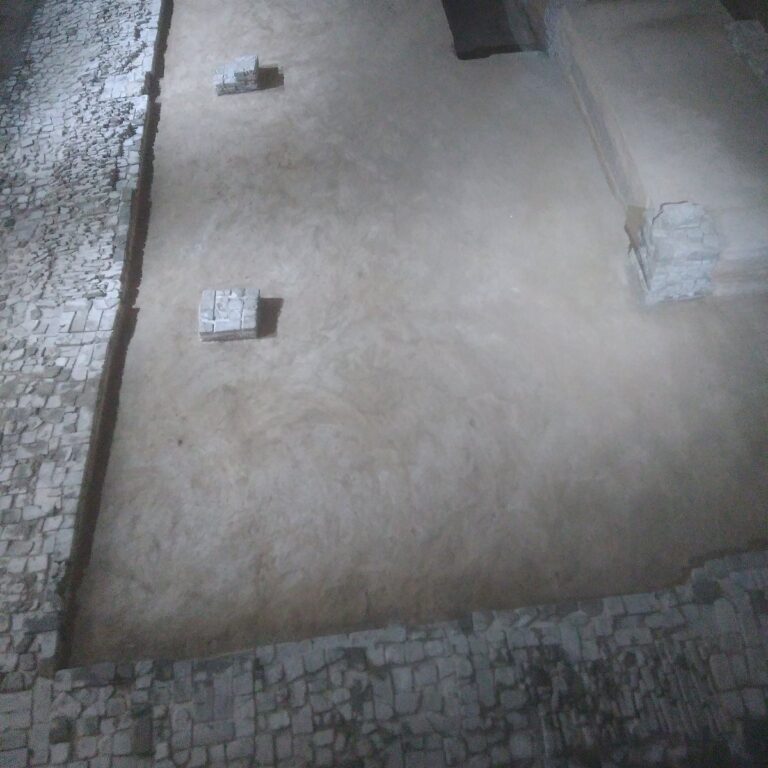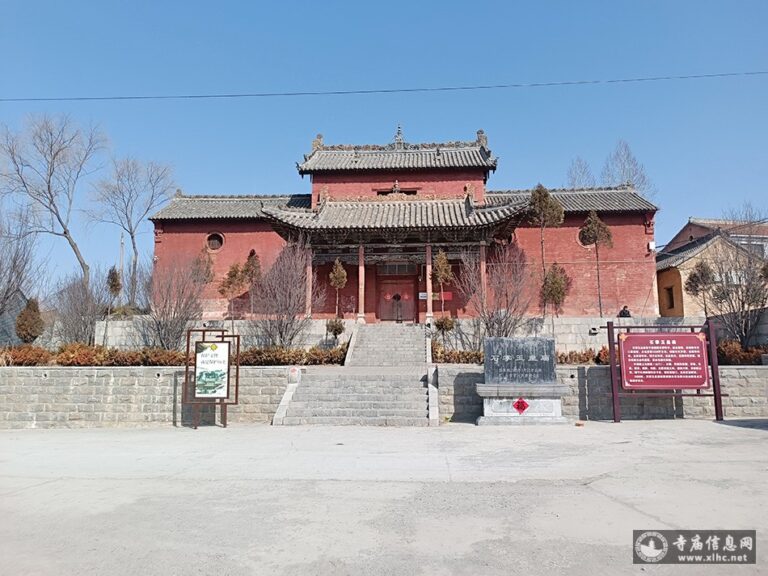Unveiling Chongqing Jingzhuba Yanguanqun: A Must-Visit Destination for Nature Lovers
An Essential Guide to Visiting Chongqing Jingzhuba Yanguanqun
In This Guide
- An Essential Guide to Visiting Chongqing Jingzhuba Yanguanqun
- The Rich History of Chongqing Jingzhuba Yanguanqun
- Main Highlights: What to See at Chongqing Jingzhuba Yanguanqun
- Planning Your Visit: A Practical Guide
- Tickets, Hours, and Booking
- How to Get There
- Local Cuisine and Accommodation
- Frequently Asked Questions
- Final Thoughts on Your Trip
Nestled amidst the breathtaking landscapes of Chongqing, the Jingzhuba Yanguanqun, or the Jingzhuba Cliff Coffin Group, presents a stunning glimpse into the ancient burial practices of a bygone era. This remarkable site, located near Wuxi County’s Baidu Town, captures the imagination with its series of suspended coffins perched high on the sheer cliffs overlooking the Jinzhuba Gorge.
Dating back over 2,000 years, these coffins are not merely a testament to the ingenuity of ancient civilizations but also a striking illustration of their profound beliefs about death and the afterlife. Crafted primarily from solid wood, many of these coffins remain remarkably well-preserved despite centuries of exposure to the elements, showcasing the exceptional craftsmanship and understanding of preservation techniques employed by their creators.
Visitors are drawn not only by the historical significance of the site but also by the sheer drama of its setting. The coffins, some reaching lengths of up to three meters, are suspended more than 100 meters above the river valley, challenging modern understandings of how ancient peoples managed to place them there. Various theories abound, ranging from the use of rudimentary pulleys to the natural accessibility of the cliffs when water levels were higher.
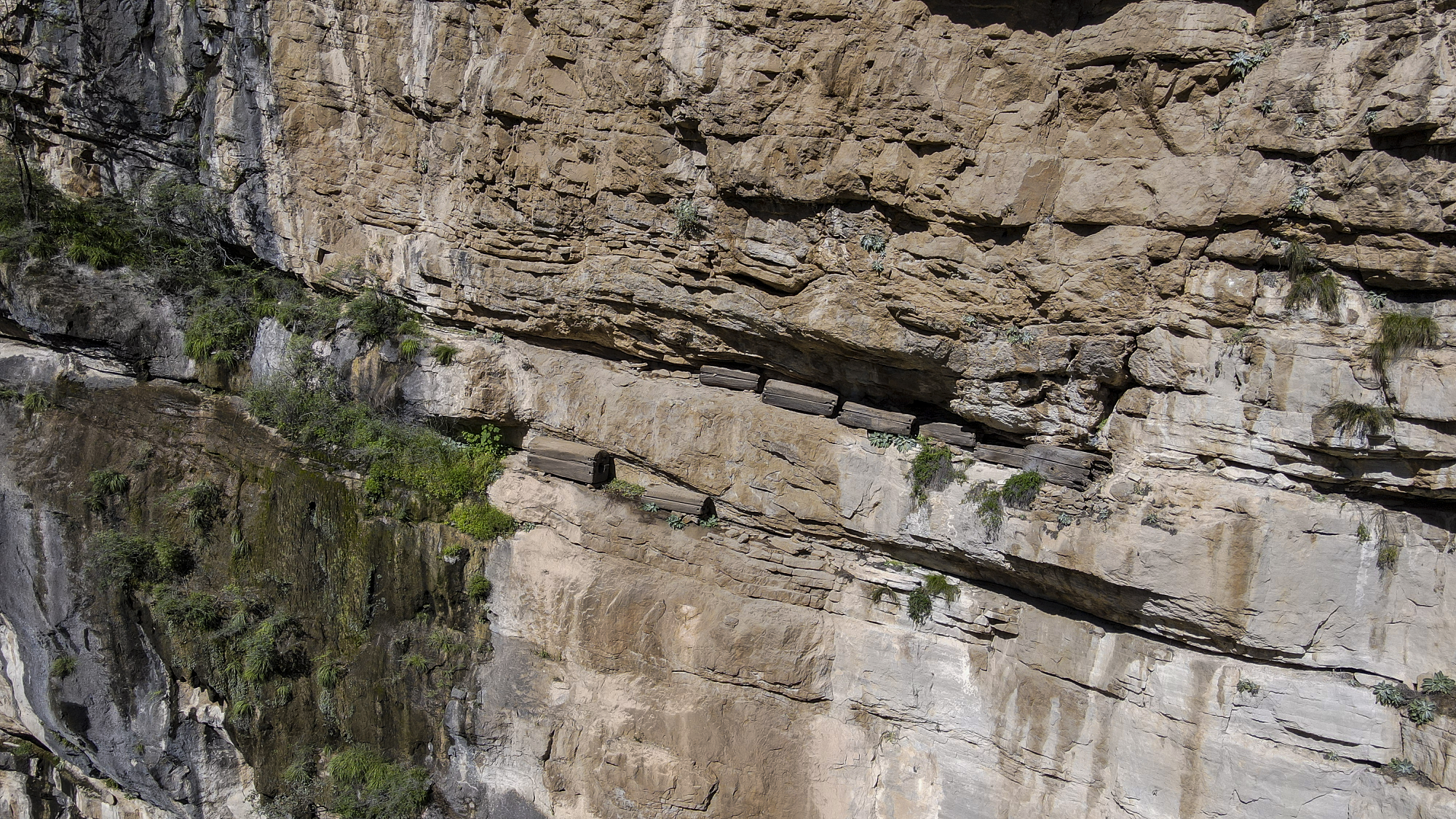
Chongqing Jingzhuba Yanguanqun.
Exploring the Jingzhuba Cliff Coffin Group offers a unique opportunity to engage with the mysteries of the past while soaking in the stunning natural beauty of Chongqing’s mountainous terrain. This site invites adventurers and history enthusiasts alike to ponder the remarkable capabilities of our ancestors and their enduring legacies etched into the cliffs of time. Whether you seek to uncover the secrets of ancient funerary practices or simply wish to marvel at the intricate relationship between nature and history, Jingzhuba promises an unforgettable experience.
The Rich History of Chongqing Jingzhuba Yanguanqun
Nestled in the rugged cliffs of Wuxi County, Chongqing, lies the remarkable Jingzhuba Yanguanqun, a collection of hanging coffins that offers a captivating glimpse into ancient burial practices. This unique burial method, known as “suspension burial,” involves placing coffins on steep cliffs or inside rock crevices, a technique that has puzzled archaeologists and historians alike.
The Jingzhuba Yanguanqun consists of 24 coffins, of which 15 are remarkably well-preserved. These ancient wooden coffins, primarily carved from high-quality nanmu (a type of cedar), exhibit extraordinary resistance to decay, attributed to the natural properties of the wood. The largest of these coffins measures approximately three meters in length and 1.5 meters in height, suspended over 100 meters above the river below, showcasing the ingenuity and resourcefulness of the ancient craftsmen.
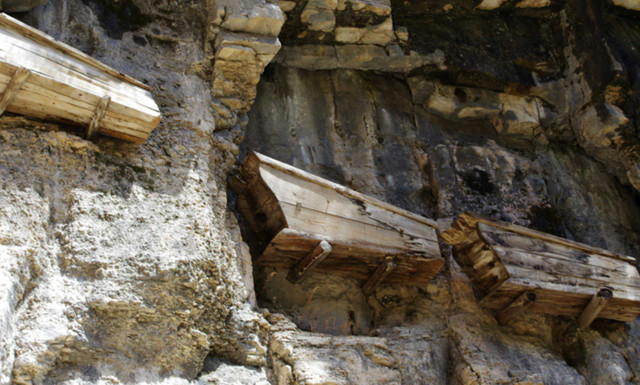
Chongqing Jingzhuba Yanguanqun.
Dating back over 2,000 years, some of the artifacts found within these coffins suggest that they originated during the Western Han Dynasty (206 BC – 9 AD). Archaeologists have surmised that the burial customs practiced at Jingzhuba were part of a broader cultural tradition among local ethnic groups, who believed in the importance of ensuring a safe passage to the afterlife. The positioning of the coffins on cliffs was likely a symbolic gesture, allowing the deceased to be closer to the heavens.
The methods employed to suspend these coffins are still debated among experts. Some theories propose that ancient peoples used simple yet effective pulley systems or ropes to hoist the coffins into place, while others suggest that a higher water level in the past may have facilitated the placement of the coffins from boats. Regardless of the exact method, it is evident that the construction of these burial sites required significant effort and advanced techniques for the time.
The Jingzhuba Yanguanqun not only serves as a testament to the burial practices of ancient civilizations but also highlights the profound connection between cultural beliefs and the natural landscape. Visitors to this site are not just stepping into a historical narrative; they are experiencing a living connection to the customs and traditions of a civilization that thrived thousands of years ago. As such, the hanging coffins of Jingzhuba stand as a remarkable reminder of humanity’s enduring quest to honor the dead and understand the mysteries of life and death.
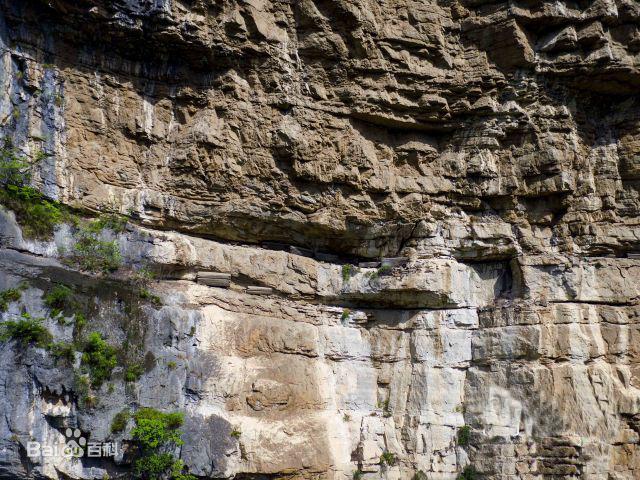
Chongqing Jingzhuba Yanguanqun.
Main Highlights: What to See at Chongqing Jingzhuba Yanguanqun
Nestled in the stunning cliffs of Wuxi County, Chongqing Jingzhuba Yanguanqun, or the Jingzhuba Cliff Burial Site, is an extraordinary archaeological marvel that captivates visitors with its blend of mystery and history. This unique site features a collection of hanging coffins, known as “suspension coffins,” which date back over 2,000 years, primarily from the Western Han dynasty. Here are the main highlights that make this site a must-visit:
1. Architectural Wonder:
The coffins are ingeniously crafted from solid nanmu wood, renowned for its durability and resistance to decay. Suspended over 100 meters above the water, these coffins showcase remarkable engineering skills of ancient civilizations. The largest coffin measures approximately three meters in length and 1.5 meters in height, creating a striking visual against the rocky cliff face.
2. Historical Significance:
Jingzhuba Yanguanqun is not just a burial site; it offers profound insights into the burial practices and beliefs of ancient cultures in the region. Archaeological studies of the accompanying artifacts found within the coffins suggest a rich tradition of funerary customs, highlighting the importance of the afterlife in historical Chinese society.
3. Scenic Location:
Situated along the stunning Jinzhuba Gorge, the site is enveloped in breathtaking natural beauty. The juxtaposition of the rugged cliffs and the serene waters below creates a picturesque backdrop, making it an ideal spot for photography and contemplation.
4. Archaeological Mystery:
The methods used to place these coffins high on the cliffside remain a topic of intrigue. While theories abound, including the use of pulleys and ropes, the exact techniques are still debated among scholars, adding an air of mystery to the site that fascinates both tourists and researchers alike.
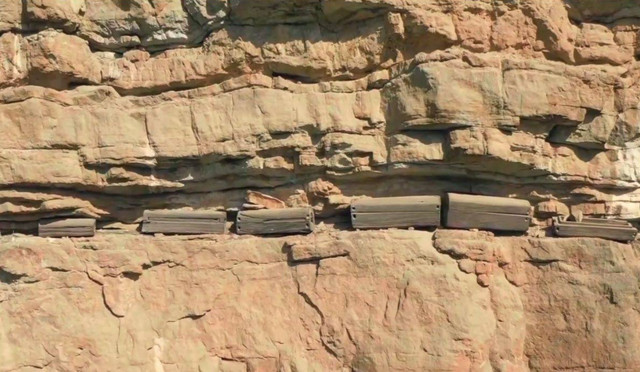
Chongqing Jingzhuba Yanguanqun.
5. Accessibility and Visitor Experience:
Located about 30 kilometers from the city center of Wuxi, the site is accessible to visitors, with facilities that enhance the exploration experience. Guided tours are available, providing insights into the archaeological significance and historical context of the coffins.
6. Cultural Exploration:
Visiting Jingzhuba Yanguanqun not only allows for an appreciation of ancient craftsmanship but also offers a glimpse into the cultural heritage of the region. Engaging with local guides and exploring surrounding areas can deepen one’s understanding of the historical narrative that shaped this remarkable site.
In conclusion, Chongqing Jingzhuba Yanguanqun stands as a testament to the ingenuity of ancient civilizations and their profound connection to the natural world. Whether you’re a history buff, an archaeology enthusiast, or simply seeking a scenic escape, this site promises an unforgettable experience that bridges the past and present.
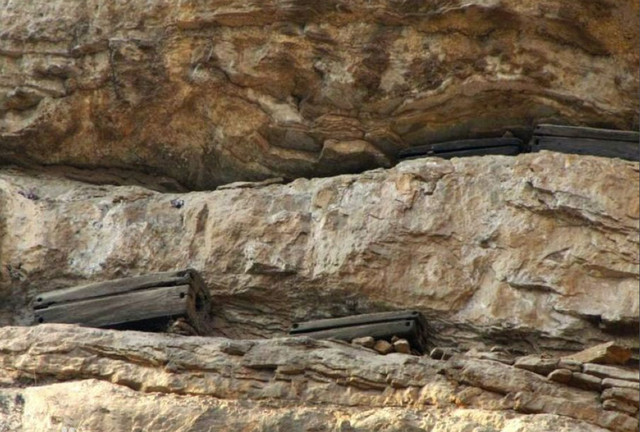
Chongqing Jingzhuba Yanguanqun.
Planning Your Visit: A Practical Guide
Practical Guide to Visiting the Chongqing Jingzhuba Yanguanqun (荆竹坝岩棺群)
Visiting the Jingzhuba Yanguanqun, a fascinating cluster of hanging coffins located in the Wuxi County of Chongqing, is an adventure steeped in history and mystery. This unique burial site offers an insight into ancient practices and a glimpse of breathtaking natural beauty. Here’s everything you need to know for a successful visit.
Getting There
The Jingzhuba Yanguanqun is situated about 30 kilometers from Wuxi County Town, specifically near the village of Xiangshu in the Baidu Town of Banqiao County. The best way to reach the site is by road. You can hire a taxi or arrange for a private car. Public transport options may also be available but can be less convenient.
- By Car: If driving, take the main highways leading to Wuxi County. Follow signage for Xiangshu Village.
- Public Transport: Check local bus schedules for routes heading toward Wuxi County and inquire about connecting services to Banqiao County.
Best Time to Visit
The ideal time to explore the Jingzhuba Yanguanqun is during the spring (March to May) and autumn (September to November) months. The weather during these seasons is generally mild, making it comfortable for hiking and exploration.
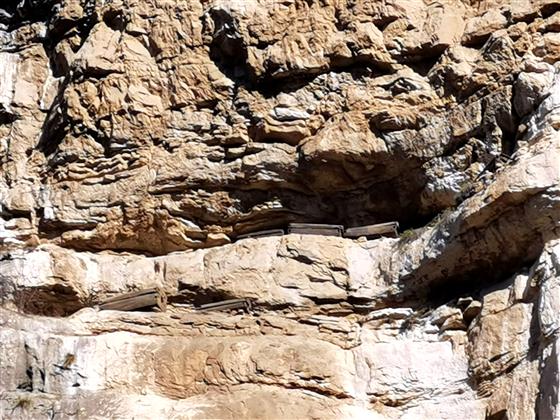
Chongqing Jingzhuba Yanguanqun.
What to Expect
Upon arrival, visitors will encounter a stunning landscape characterized by steep cliffs overlooking the Jinzhuba Gorge. The hanging coffins, numbering around 24, are believed to date back to the Western Han Dynasty, showcasing remarkable ancient burial practices.
- Viewing the Coffins: The coffins are primarily made from solid wood, specifically camphor and nanmu, and are ingeniously carved and suspended from the cliff walls. The largest coffin measures approximately 3 meters in length and 1.5 meters in height.
- Photography: The site provides ample opportunities for photography, especially with the dramatic backdrop of the gorge. However, be mindful of the safety measures in place.
Safety Considerations
While the site is generally safe for visitors, exercise caution when approaching the edges of the cliffs. Wear sturdy footwear and be prepared for uneven terrain. If traveling with children or elderly individuals, keep a close watch to ensure their safety.
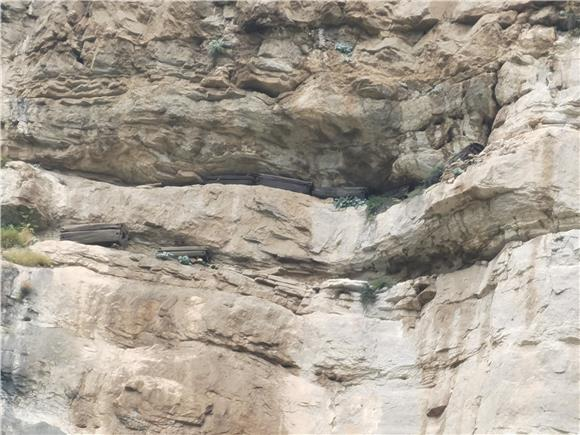
Chongqing Jingzhuba Yanguanqun.
Local Amenities
There are limited amenities near the site, so it is advisable to come prepared. Here are some recommendations:
- Food and Water: Bring water and snacks with you as there may not be food vendors nearby.
- Restroom Facilities: Public restrooms might not be available; consider using facilities in Wuxi County before heading to the site.
Cultural Insights
The hanging coffin tradition is a unique aspect of ancient Chinese culture. These coffins were typically placed in inaccessible locations to honor the deceased, reflecting beliefs about the afterlife and ancestral respect. Engaging with local guides can provide deeper insights into this fascinating aspect of history.
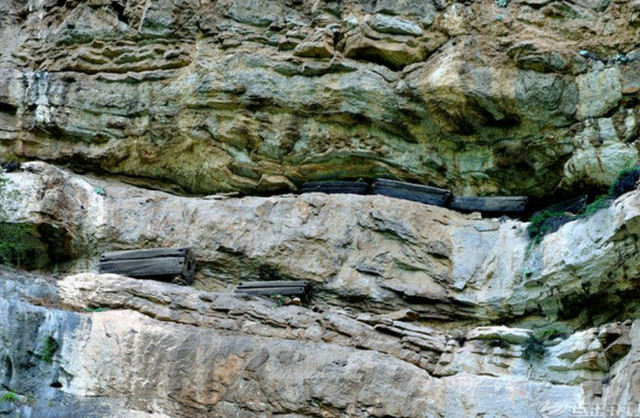
Chongqing Jingzhuba Yanguanqun.
Nearby Attractions
If you have time, consider exploring other nearby attractions in Wuxi County. The area is rich in natural beauty and cultural sites, including:
- Wuxi County Museum: Learn more about the local history and culture.
- Scenic Areas: The surrounding mountains and rivers offer opportunities for hiking, photography, and enjoying the natural landscape.
Final Tips
- Plan Your Visit: Check the weather and prepare accordingly.
- Respect the Site: As a historical site, ensure you follow any guidelines set by local authorities to protect the integrity of the coffins and the natural environment.
- Engage with Locals: Local guides can enhance your experience with stories and knowledge about the area.
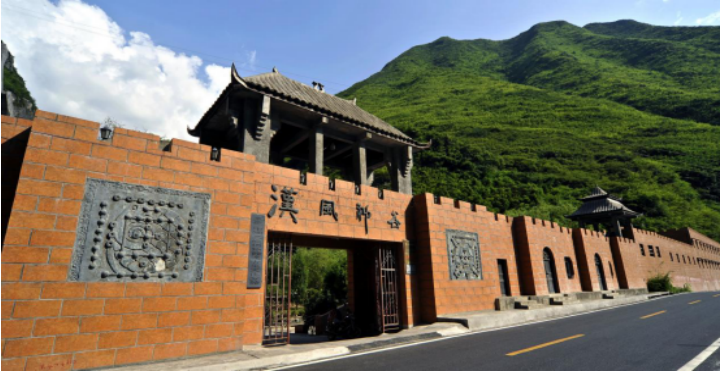
Chongqing Jingzhuba Yanguanqun.
By following this practical guide, you can ensure a memorable and enriching visit to the Jingzhuba Yanguanqun, a true testament to ancient ingenuity and cultural heritage.
Tickets, Hours, and Booking
Visiting the Chongqing Jingzhuba Yanguanqun (荆竹坝岩棺群) offers a unique opportunity to explore one of China’s most fascinating archaeological sites, renowned for its ancient hanging coffins. Here’s everything you need to know about ticketing for this intriguing destination.
Ticket Information
Admission Fees:
– General Admission: Approximately CNY 30 (about USD 5) per person. This fee grants access to the site and its surrounding areas, allowing you to marvel at the impressive hanging coffins and the stunning cliffside views.
Operating Hours:
– Daily Opening: 8:00 AM – 6:00 PM (last entry at 5:30 PM).
It is advisable to arrive early to fully enjoy the site without the crowds and to explore the nearby hiking trails.
Where to Buy Tickets:
– Tickets can be purchased at the entrance of the Jingzhuba Yanguanqun site.
– For larger groups or tour packages, consider booking in advance through local travel agencies or online platforms that cater to tourist attractions in Chongqing.
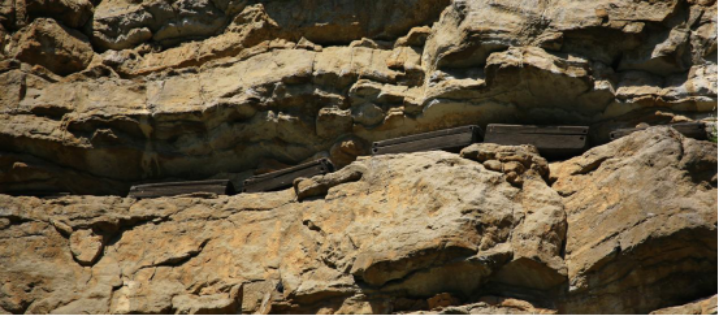
Chongqing Jingzhuba Yanguanqun.
Additional Costs:
– Guided Tours: While self-exploration is encouraged, you may opt for a guided tour for a more in-depth understanding of the historical and cultural significance of the site. Prices for guided tours vary, but expect to pay anywhere from CNY 50 to CNY 100 (USD 7-14) per person.
– Photography Permits: If you plan on taking professional photographs, check if a photography permit is required at the entrance.
Accessibility:
The site is situated on a cliffside, so be prepared for a moderate hike to reach the viewing areas. Wear comfortable shoes, and consider bringing water and snacks for your visit.
Transportation Tips:
– Getting There: The Jingzhuba Yanguanqun is approximately 30 kilometers from Wuxi County. Public transportation options, such as local buses or taxis, are available. For a more convenient option, consider renting a car or joining a guided tour that includes transportation.
By planning your visit and understanding the ticketing details, you can fully immerse yourself in the rich history and breathtaking views that the Chongqing Jingzhuba Yanguanqun has to offer.
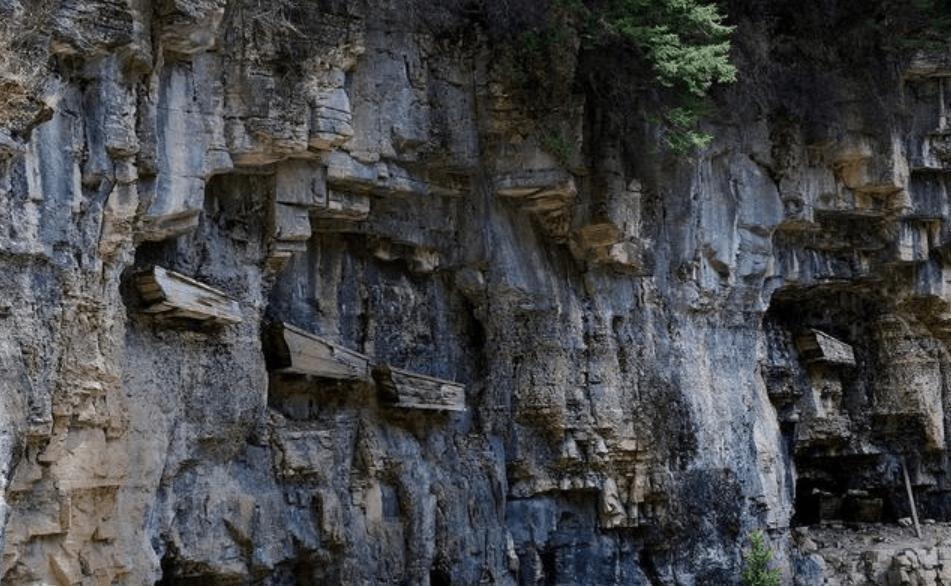
Chongqing Jingzhuba Yanguanqun.
How to Get There
Reaching the Chongqing Jingzhuba Yanguanqun (荆竹坝岩棺群) requires some planning, but the journey is well worth it for those intrigued by ancient mysteries and stunning landscapes. Here’s your guide to navigating the various transportation options available to get to this captivating archaeological site.
Getting There
By Air
The nearest major airport is Chongqing Jiangbei International Airport (CKG), which serves both domestic and international flights. From the airport, you can hire a taxi or book a ride-sharing service to reach your next destination.
By Train
Chongqing is well-connected by rail, making it easy to travel from other major Chinese cities. You can take a high-speed train to Chongqing North Railway Station or Chongqing Railway Station. Once in Chongqing, the best way to get to the Jingzhuba Yanguanqun is to continue by road.
By Bus
From Chongqing city center, you can take a bus to Wuxi County (巫溪县), which is about 30 kilometers away from the Jingzhuba site. Buses to Wuxi depart frequently from various bus stations in Chongqing, such as the Chaotianmen Bus Station. The journey takes approximately one to two hours, depending on traffic.
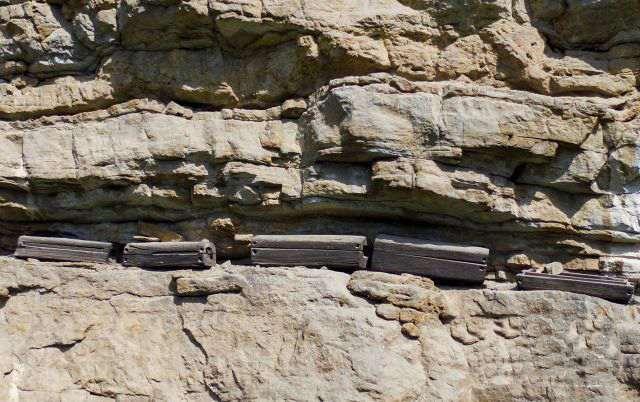
Chongqing Jingzhuba Yanguanqun.
By Car
For a more flexible option, consider renting a car. Driving from Chongqing to the Jingzhuba Yanguanqun gives you the opportunity to enjoy the scenic views along the way. The route generally follows the G65 highway and is well-marked. Be prepared for winding mountain roads as you approach Wuxi County.
Local Transportation
Upon arriving in Wuxi County, you may need additional transportation to reach the site itself. Local taxis and ride-sharing services are available, but it’s advisable to confirm the fare before starting your journey. Alternatively, you can hire a local guide who can provide transportation and valuable insights about the area.
Tips for Travelers
- Plan Ahead: Check the bus and train schedules in advance, especially during peak travel seasons.
- Language Barrier: While some signs are in English, having a translation app or a local guide can be helpful, as English is not widely spoken in rural areas.
- Safety First: If you’re driving, ensure your vehicle is equipped for mountain driving, and always check the weather conditions before you go.
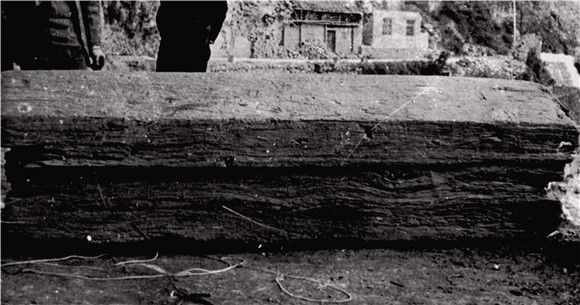
Chongqing Jingzhuba Yanguanqun.
With this comprehensive transportation guide, you’ll be well on your way to uncovering the wonders of the Chongqing Jingzhuba Yanguanqun! Enjoy your adventure into the past as you explore these extraordinary ancient burial sites.
Local Cuisine and Accommodation
When visiting the stunning Jingzhuba Yanguanqun (荆竹坝岩棺群) in Chongqing, it’s essential to complement your exploration of this ancient burial site with delightful local cuisine and comfortable accommodation options. Here’s a guide to help you savor the flavors of the region and find the perfect place to rest after a day of adventure.
Culinary Delights
Chongqing is renowned for its bold and spicy flavors, particularly its famous hotpot. While near Jingzhuba Yanguanqun, you can indulge in several regional specialties:
-
Hotpot (火锅): A must-try when in Chongqing, hotpot is a communal dining experience where you cook various ingredients—such as thinly sliced meats, vegetables, and tofu—in a bubbling pot of spicy broth. Look for local restaurants that serve authentic Chongqing hotpot for an unforgettable meal.
-
Sichuan Noodles (四川面条): Savor the rich flavors of Sichuan noodles, often served with a spicy sauce made from chili oil, garlic, and peanuts. Pair them with some pickled vegetables or a side of dumplings to enhance your culinary experience.
-
Grilled Fish (烤鱼): Another local favorite, grilled fish is typically marinated with spices and grilled to perfection. The smoky flavor combined with the spices makes it a delightful dish to share with friends or family.
-
Street Food: Take a stroll through local markets and street stalls to sample snacks like spicy skewers, rice cakes, and sweet potato balls. These tasty bites offer a great way to experience local culture and flavors while exploring the area.
Where to Stay
After a day of discovering the mysteries of the Jingzhuba Yanguanqun, you’ll want a comfortable place to unwind. Here are some accommodation options close to the site:
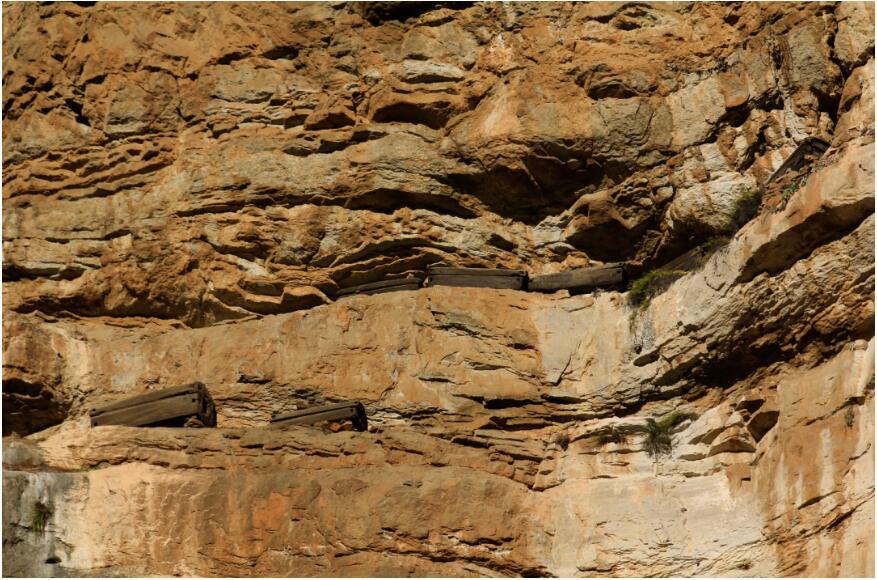
Chongqing Jingzhuba Yanguanqun.
-
Local Guesthouses: For a more intimate experience, consider staying at a local guesthouse. These often provide a homely atmosphere and the chance to interact with locals. Some guesthouses even offer traditional meals, giving you a taste of authentic Chongqing hospitality.
-
Mid-Range Hotels: If you prefer more amenities, several mid-range hotels in the nearby towns offer comfortable rooms, Wi-Fi, and dining options. Look for hotels that provide easy access to local attractions and transportation services.
-
Luxury Hotels: For those seeking a more upscale experience, there are luxury hotels available in Chongqing city. These establishments typically feature modern facilities, fine dining, and stunning views of the Yangtze River, making them perfect for relaxation after a day of exploration.
-
Camping Options: If you’re an outdoor enthusiast, consider camping near the scenic areas surrounding Jingzhuba Yanguanqun. Check local regulations and facilities to ensure a safe and enjoyable experience under the stars.
Final Thoughts
Whether it’s indulging in spicy hotpot, savoring Sichuan noodles, or relaxing in a cozy guesthouse, the experience surrounding Jingzhuba Yanguanqun is sure to be memorable. Make the most of your visit by immersing yourself in the local flavors and enjoying the hospitality that Chongqing has to offer!
Frequently Asked Questions
-
What is the Chongqing Jingzhuba Yanguanqun?
The Chongqing Jingzhuba Yanguanqun, or Jingzhuba Rock Coffin Group, is an ancient burial site located in Wuxi County, Chongqing, China. It features a series of ancient hanging coffins carved into the cliffs, which date back over 2,000 years, showcasing the ingenuity of ancient burial practices. -
How do I get to Jingzhuba Yanguanqun?
The site is approximately 30 kilometers from Wuxi County’s city center. Visitors can reach it by car or taxi, and it’s advisable to check local transportation options or guided tours that may provide transportation. -
What is the significance of the hanging coffins?
The hanging coffins are believed to be linked to ancient burial practices where coffins were placed in elevated locations to deter scavengers and symbolize a connection between the living and the spirit world. The craftsmanship and preservation of these coffins provide insights into the cultural and historical practices of the era. -
Are there facilities for visitors at the site?
Facilities may be limited, so it’s advisable to bring necessities such as water, snacks, and sun protection. The area is primarily focused on the archaeological and scenic experience, so plan accordingly. -
What should I wear when visiting?
Comfortable walking shoes are recommended, as accessing the site may involve walking on uneven terrain. Additionally, dressing in layers is wise, as temperatures can vary throughout the day. -
Can I take photographs at the site?
Yes, photography is generally permitted at Jingzhuba Yanguanqun. However, it’s essential to respect the site and follow any posted guidelines regarding where and what you can photograph. -
Is it safe to visit the cliffs where the coffins are located?
While the site is a popular tourist destination, caution is advised. Stay within designated paths and areas to ensure safety, as the cliffs can be steep and unstable in certain spots. -
Are there guided tours available?
Yes, there are guided tours that provide in-depth information about the history and significance of the site. These tours can enhance the visitor experience by offering context and stories related to the coffins and the culture surrounding them. It’s best to book in advance, especially during peak tourist seasons.
Final Thoughts on Your Trip
Visiting the Chongqing Jingzhuba Yanguanqun offers a profound glimpse into ancient Chinese funerary practices, showcasing the ingenuity and resourcefulness of our ancestors. Suspended high above the ground in the rugged cliffs of Wuxi County, these remarkable hanging coffins stand as a testament to the mysteries of human life and death, inviting explorers and history enthusiasts alike to ponder the stories of those who came before us.
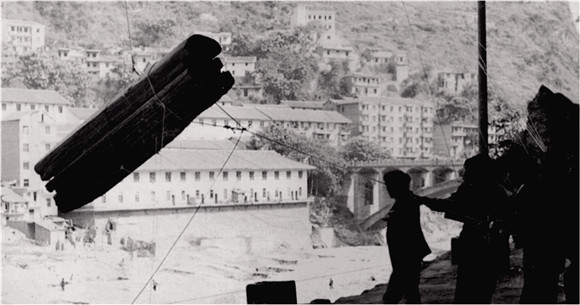
Chongqing Jingzhuba Yanguanqun.
As you embark on this journey, surrounded by breathtaking natural beauty and steeped in rich cultural heritage, take a moment to reflect on the remarkable craftsmanship and the enduring legacy of the civilizations that thrived in this region over two millennia ago. The Jingzhuba hanging coffins are not only a remarkable archaeological site but also a powerful reminder of the connection between past and present.
Whether you are an adventurer seeking the thrill of discovery or a history buff eager to unravel the secrets of ancient traditions, the Jingzhuba Yanguanqun promises an unforgettable experience that transcends time and ignites the imagination. Prepare to be awed by this incredible site and let it inspire you to delve deeper into the rich tapestry of human history.
